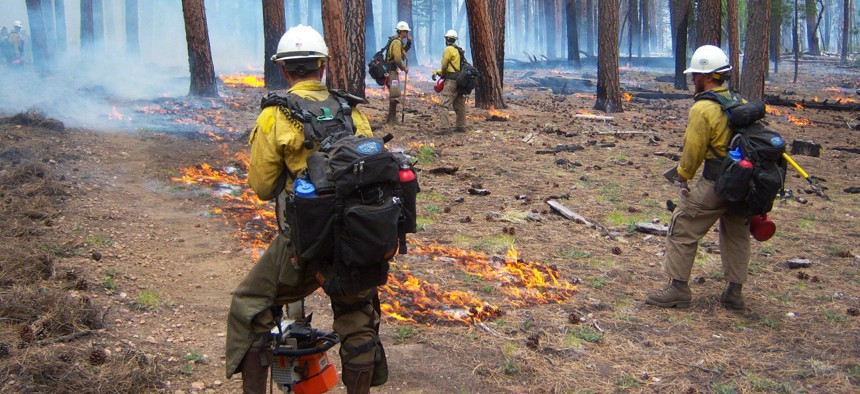
Funding to boost firefighters' pay will run out unless Congress acts. National Park Service
Bipartisan wildland firefighter ‘pay cliff’ fix introduced in Senate
Without congressional action by September, the federal government’s wildland firefighters will see their paychecks shrink as temporary pay increases expire.
A bipartisan group of senators on Wednesday introduced legislation aimed at averting a “pay cliff” where the federal government’s corps of wildland firefighters could see sizeable decreases in their pay checks in October, absent congressional action.
Wildfire response staffing among federal agencies has been a hot topic in recent years. As President Biden took office, wildland firefighters routinely made less than the $15 per hour minimum wage for government work the new president envisioned. In 2021, Biden issued a series of cash bonuses to ensure federal firefighters’ pay met that threshold, and last year, thanks to the bipartisan infrastructure law, wildland firefighters received pay raises of $20,000 per year or 50% of their base salary, whichever was lower.
However, that 2022 salary increase came with a catch. The bipartisan infrastructure law only included enough funding for the pay raises to last until the end of the current fiscal year, or Sept. 30. Unless Congress passes additional legislation, wildland firefighters will see their paychecks shrink dramatically in October, something federal employee unions and other employee groups warn will lead to a mass exodus from federal jobs to better-paying state and local governments, further exacerbating federal agencies’ firefighter staffing shortages.
On Wednesday, a bipartisan group of senators led by Sen. Kyrsten Sinema, I-Ariz., introduced the Wildland Firefighter Paycheck Protection Act (S. 2272). The bill makes 2022 pay raises permanent by creating a special pay rate for federal firefighters—based on percentage increases to each level of the General Schedule—and provides a new pay supplement to compensate firefighters for every day they are deployed to combat a wildfire. The bill also directs agencies to create a single consistent policy related to work-life balance and to study new opportunities to improve rest and recuperation time for firefighters in an effort to combat burnout.
“Wildland firefighters in Arizona and across the country risk their lives to keep our communities safe,” Sinema said in a statement. “Recognizing their sacrifice and hard work, I secured fair pay in my bipartisan infrastructure law for wildland firefighters, and now I’m ensuring this pay is permanent.”
Joining Sinema in sponsoring the legislation are Sens. John Barrasso, R-Wyo., Joe Manchin, D-W.Va., Steve Daines, R-Mont., Alex Padilla, D-Calif., and Jon Tester, D-Mont.
“Montana’s wildland firefighters put their lives on the line to protect our communities and public lands, and the least we can do is ensure fair and competitive pay for the work they do,” Tester said. “This fire season, these brave men and women are our first line of defense against disaster, and they’ve earned the right to be fairly compensated for the dangerous work they do—including for adequate recovery time after a tough fire.”
National Federation of Federal Employees President Randy Erwin, whose union represents around 10,000 wildland firefighters, applauded the bill’s introduction but urged continued pressure to enact the legislation.
“It is critical that Congress passes this legislation as soon as possible,” Erwin said. “If the provisions within this law do not pass by Sept. 30, federal wildland firefighters will endure a pay cliff of a 50% cut to their base pay up to $20,000. If this happens, a mass exodus will begin that may be impossible to stop . . . It should be evident to every member of Congress that the wildfire crisis is not slowing down any time soon. We must do everything we can to protect our life and property from wildfires and that are now happening in every corner of the country.”
The Senate Homeland Security and Governmental Affairs Committee has scheduled a markup on the legislation for next week.







